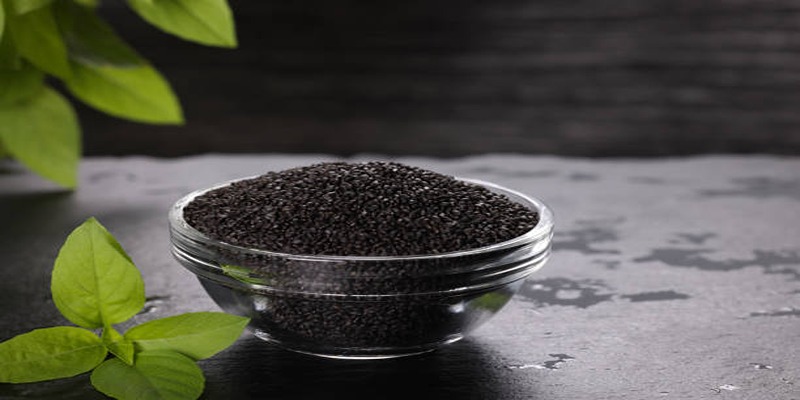Basil Seeds vs. Chia Seeds: A Nutritional Showdown
Feb 25, 2024 By Madison Evans
When it comes to superfoods, seeds are often at the forefront of the conversation, packing a powerful punch of nutrition in tiny packages. Lately, basil seeds and chia seeds have both captured the attention of health enthusiasts worldwide. But how do these seeds stack up against one another in terms of nutritional benefits? In this comprehensive guide, we will delve deep into the nutritional profiles and health advantages of both seed types, while ensuring our discussion remains respectful, educational, and within the realms of general wellness and culinary exploration.
History of basil seeds:
Basil seeds have been used for thousands of years in traditional Ayurvedic and Chinese medicine. They were believed to have medicinal properties and were often used to treat ailments such as respiratory issues, digestive problems, and joint pain. In these ancient cultures, basil seeds were also revered for their ability to cool the body during hot summer months.
What are Basil Seeds?
Basil seeds—also known as sabja or tukmaria seeds—are derived from the sweet basil plant. Their origin traces back to India and the Mediterranean regions.
Nutritional Composition of Basil Seeds
Basil seeds are known for their rich fiber content, which makes up a significant percentage of their mass. They are also a good source of omega-3 fatty acids, essential for heart health.
Health Benefits of Basil Seeds
These tiny seeds are celebrated for their possible contributions to digestive health, satiety, and blood sugar regulation. Their high fiber content is particularly noted for supporting the gastrointestinal tract.
How to Use Basil Seeds?

- Soak in water for 10-15 minutes to form a gel-like outer layer, perfect for adding to drinks like smoothies and juices
- Sprinkle on top of salads or use as a topping for yogurt or oatmeal
- Use as an egg substitute in vegan baking recipes
Health Benefits of Basil Seeds:
- May aid in digestion and reduce bloating due to their high fiber content
- Can contribute to feeling fuller for longer, potentially aiding in weight management
- May help regulate blood sugar levels due to their slow-digesting nature.
What are Chia Seeds?
Chia seeds originate from a flowering plant in the mint family, native to Central America, and have been a staple in Mayan and Aztec diets for centuries.
Nutritional Composition of Chia Seeds
Chia seeds are a whole-grain food, typically grown organically and are non-GMO. They are loaded with nutrients that can have important benefits for your body and brain.
How to Use Chia Seeds?
- Add to baked goods like muffins or bread for a boost of nutrients
- Mix into yogurt or oatmeal for a energy-packed breakfast
- Sprinkle on top of salads or stir-frys for some added texture
Comparison of Nutritional Profiles:
We will explore how basil seeds and chia seeds compare in terms of macronutrients like proteins, fats, and carbohydrates, as well as micronutrients including vitamins and minerals.
Macronutrients
Both basil and chia seeds contain healthy fats and are an excellent source of vegetarian protein, which can contribute to muscle repair and growth.
Micronutrients
Basil seeds and chia seeds offer a variety of vitamins and minerals like calcium, magnesium, and potassium, which play key roles in bodily functions.
Fiber Content
These seeds boast high levels of dietary fiber, promoting a healthy digestive system and potentially aiding weight management efforts.
Antioxidant Properties
The antioxidant content in both seeds helps combat oxidative stress and may reduce the risk of chronic diseases.
Health Benefits and Uses:
Both seeds have unique properties that can support overall health. They've been linked to improvements in digestion, weight management, and cardiovascular health.
Digestive Health
Their high soluble fiber works as a prebiotic that supports good bacteria in the gut, leading to better digestive health.
Weight Management
The fiber content in both seeds can also help in weight management by providing a feeling of fullness and reducing appetite.
Heart Health
Omega-3 acids play a crucial role in heart health, and both types of seeds are a great way to get your intake of these essential fats.
Blood Sugar Control
Both basil and chia seeds can play a role in regulating blood sugar levels, which is crucial for those with diabetes.
Skin and Hair Health
Rich in antioxidants and nutrients that can help protect the skin and nourish hair, these seeds are often included in beauty regimes.
Culinary Uses and Recipes:
Basil Seeds in Recipes
Due to their ability to absorb water and form a gel-like texture, basil seeds are often used in drinks and desserts.
Chia Seeds in Recipes
Chia seeds can be added to smoothies, breakfast bowls, and baked goods for an extra boost of nutrients.
Taste and Texture
While basil seeds have a mild flavor suited for beverages, chia seeds have a more neutral taste, making them more versatile in recipes.
Potential Side Effects and Precautions:

While these seeds are generally healthy, there are considerations when adding them to your diet.
Allergies and Sensitivities
As with any food, some individuals may experience allergies or sensitivities to either basil or chia seeds.
Digestive Issues
Because they are high in fiber, overconsumption of these seeds without adequate hydration can lead to digestive discomfort.
Recommended Dosage and Moderation
It's important to follow recommended serving sizes and incrementally introduce these seeds into your diet to prevent adverse effects.
Market Availability and Sustainability:
Both basil and chia seeds are widely available in most supermarkets, health food stores, and online retailers. To ensure sustainability, it's best to opt for organic and non-GMO options.
Conclusion
This nutritional showdown reveals that while both basil seeds and chia seeds offer substantial health benefits, they each have unique properties that cater to different dietary needs and preferences. Whether you gravitate toward the slightly more iron-rich basil seeds or favor the higher protein content of chia seeds, incorporating either into your diet can contribute to a balanced and nutritious lifestyle. Remember, when navigating your health journey, moderation and dietary diversity are key. Enjoy exploring the multitude of ways these seeds can serve not just your health but also tantalize your taste buds!








